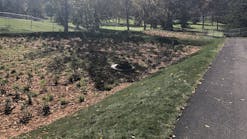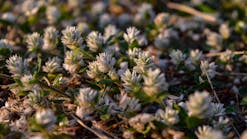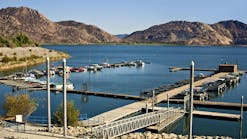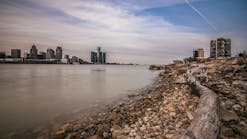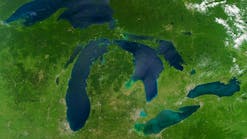About the author: Robert Gray works out of Locust Grove, Virginia; (540) 972-3161.
EPA Finalizes Storm Water Rule the Storm Water Phase II Rule has been finalized by the Environmental Protection Agency. When fully effective in early 2003, it will extend permitting requirements on stormwater discharges to smaller municipalities and construction sites not covered by the Phase I rules now in place.The new rules apply to municipalities that have less than 100,000 population and are in urbanized areas and to construction sites of one to five acres. Sites of less than an acre could be covered under some circumstances.
Phase I rules affecting larger communities and construction sites, plus specific categories of industrial activity, have been in place since 1990. Interim Phase II rules were set in 1995 and now have been superceded by the latest regulations.
EPA said in announcing finalization of the new regulation, that since storm water is carried into sewer systems and usually discharged untreated, it can contaminate drinking and recreational waters and is a major source of beach and shellfish-bed closures.
Storm water runoff washes sediment from construction sites at a rate of 20 to 150 tons per acre each year, the agency noted, and such sediment "has been identified as the single largest cause of impaired water quality in rivers and the third largest cause of impaired water quality in lakes."
Under the Phase II rule, at least 110,000 additional construction sites and more than 5,000 municipalities will be required to obtain the permits.
Additional information on the rule is available by calling 202-260-5816, by sending an e-mail message to sw2epa.gov, or through the Internet at www.epa.gov/owm/sw/phase2.
Comment Obtained on Lower Lead Thresholds EPA has obtained public comment on its proposed rule to lower the Toxics Release Inventory (TRI) reporting thresholds for lead and lead compounds.
Meetings to seek public views on the proposal, including its potential impact on small businesses, have been held in Los Angeles, Calif.; Chicago, Ill., and Washington, D.C. Information received at the meetings will be incorporated into the agency's development of a final rule.
Bond Proposal Due For Resubmission The Clinton administration is expected to resubmit to Congress its "Better American Bonds" proposal that did not gain approval last year. The plan would establish what the White House calls "a new financing tool" that communities could use in raising funds for environmental goals that would include protection of water quality.
Under the plan, government jurisdictions would save substantial sums by not having to pay interest on Better America Bonds. Buyers of the bonds would receive federal tax credits equal to the amount of tax-exempt interest they would have received.
Because the proposal would require changes in the U.S. tax code, it lost any chance for approval this year because of the stalemate between the White House and Congress over broad tax legislation.
PBT Category Parameters Considered EPA will establish a toxic-substances category for persistent, bioaccumulative and toxic (PBT) new chemical substances.
In a preliminary step, the agency issued a policy statement establishing parameters for what is to be considered a PBT chemical under the Toxic Substances Control Act (TSCA).
EPA said that PBT chemicals are priority pollutants because they do not break down quickly and remain in the environment for long periods. These chemicals bioaccumulate, or build up, in the food chain, including fish, and are known to cause a variety of health hazards at low doses, the policy statement said.
Smith Signals Cooperative Approach The new chairman of the Senate Environment and Public Works Committee indicated in his first statement after taking that office that his leadership would not necessarily mean the polarization that some Capitol Hill observers have predicted. This committee traditionally has had a major influence on water policy.
Sen. Bob Smith, R-NH, said that "I have a good working relationship with members of both parties on this committee and have the ability to work with my colleagues to get things done." Noting the importance of matters within the panel's jurisdiction, he added, "I look forward to having a leadership role on these critical issues as chairman of this committee."
Smith succeeded the late Sen. John Chafee, R-RI, who was widely recognized as supportive of major environmental initiatives. There has been speculation on Capitol Hill that Smith will not be as supportive of the environmental community as his predecessor was.
New Panel Seeks Better Use of Nonpoint Funds U.S. water quality has declined over the past decade because of the growth of nonpoint source pollution, said a new organization team formed to identify innovative ways to reduce such pollution.
The Northwest-Midwest Institute and the Marine Studies Consortium have joined in the Nonpoint Finance Project, which will seek new ways to improve the efficiency, effectiveness and integration of federal funding programs in the nonpoint source (NPS) area.
"While perhaps $2 billion a year in grants or loans is available for NPS projects, it appears likely that existing federal fiscal resources could be used more efficiently," the new group said in launching its work.
Participants in the project's first meeting included representatives of the EPA, the Department of Agriculture, farm and environmental organizations, state governments and the financial community.
